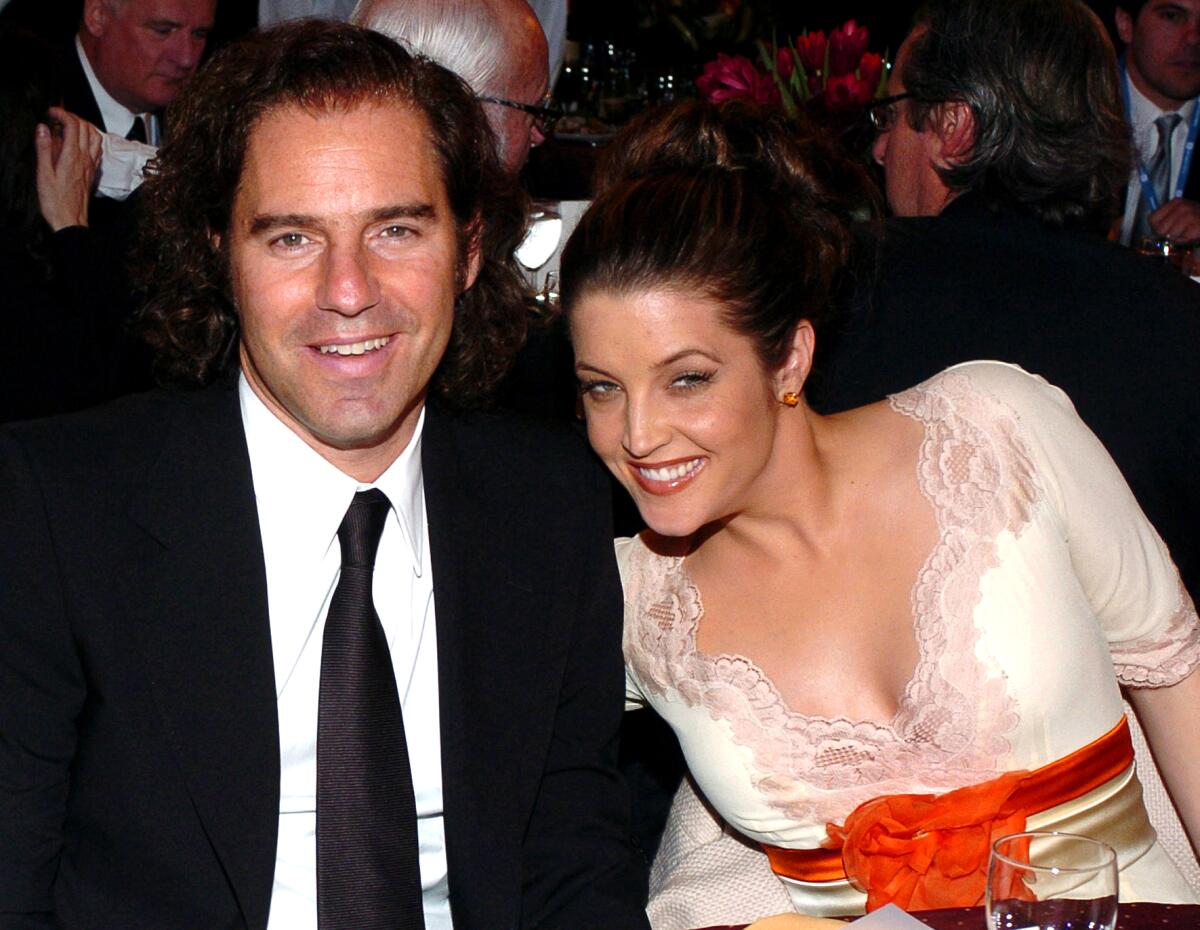Lisa Marie Presley was born ‘a princess,’ but ‘never wanted to trade off her fame’

- Share via
Andrew Slater remembers explaining to Lisa Marie Presley how this whole thing was going to work.
Twenty years ago, the veteran manager and record producer — then also the president of Presley’s storied label, Capitol Records — had cut the singer’s debut single with her in the studio, and now he was prepping her for what was to come.
“I said, ‘This song is a good entry point for what you’re doing on your album, so what we’ll do is we’ll put a promotional tour together because people will want to talk to you about the song,’” Slater recalled of “Lights Out,” a glossy but muscular pop-rock tune in which the singer addresses her background as the only child of Elvis and Priscilla Presley. “‘We’ll go to radio stations in a couple cities and get up early and do morning shows.’ And she goes, ‘I just have one question: Can I bring my plane?’” Slater laughed. “I said, ‘As long as we don’t park it at the radio station, I think we’re good.’”
A rookie artist with all the comforts — and some of the burdens — of success: That was Lisa Marie Presley’s strange position as she embarked on a music career in her mid-30s after decades of tabloid notoriety brought on by a series of high-profile marriages and of course by her intimate connection to one of the most consequential cultural figures of all time. The singer, who died Thursday at age 54 after suffering cardiac arrest, released three studio albums, beginning with 2003’s “To Whom It May Concern,” which featured “Lights Out” and went on to be certified gold for sales of more than 500,000 copies; a second LP, “Now What,” came out in 2005, followed seven years later by “Storm & Grace.”

Each showcased Presley’s bluesy vocals and a songwriting talent she used to illuminate her complicated family history. “Someone turned the lights out there in Memphis / That’s where my family’s buried and gone,” she sang over the pealing guitars and driving groove of “Lights Out,” “Last time I was there I noticed a space left / Next to them there in Memphis, in the damn back lawn.” (On Friday, a spokesperson said Lisa Marie would be buried at Graceland, her father’s estate in Memphis, near Elvis and other family members, including Lisa Marie’s son, Benjamin Keough, who died in 2020.)
Yet despite the familiar snarl in her voice — not to mention the darkly sensual eyes that instantly evoked her dad in photos — Presley was determined to create her own path in the music industry, according to people who worked with her.
“Lisa Marie never wanted to trade off her status and fame,” said Glen Ballard, the seasoned songwriter and producer who co-wrote much of the material, including “Lights Out,” on “To Whom It May Concern.” “It was like being born a princess — kind of an accident of birth. She always felt there was some unearned capital there.”
In the wake of the death of Lisa Marie Presley, daughter of Elvis Presley, all eyes are on the rock icon’s Graceland estate and his other personal effects.
Slater says “Lights Out,” which peaked at No. 18 on Billboard’s adult pop airplay chart, was originally called “Memphis” but that Presley was “very apprehensive” about the title and so changed it. “I respected that because she wasn’t trying to draw too hard a line [between her and Elvis],” Slater said. “She was doing music for the right reason, which was that she had something to say and music was the vehicle for her to express herself emotionally.”
Indeed, Presley had begun writing songs when she was 20, she told Playboy in a 2003 interview, “for cathartic reasons, as an outlet. I just haven’t been doing it publicly.” She needed time to “find my way, stylistically,” she said. In 1998 she struck up her collaboration with Ballard, who’d co-written “Man in the Mirror” by Michael Jackson (to whom Presley was married from 1994 to 1996) and who’d produced Alanis Morissette’s 1995 blockbuster “Jagged Little Pill,” which Presley identified as an inspiration.
Though she was wary of profiting from her father’s renown — or at least of being seen that way — “the unusual circumstances of her life couldn’t be ignored, in her own psyche or as an artist,” Ballard said. “We had many conversations about it, and finally she came to the conclusion that she could write about her experiences. I mean, to deny it would have been artistically fraudulent on some level.” Other tunes on “To Whom It May Concern” take up her string of broken relationships — Presley was also married to musicians Danny Keough and Michael Lockwood and actor Nicolas Cage — and the media’s treatment of Elvis near the end of his life.
As Ballard points out, Presley had “absolutely no experience grinding it out in clubs to sort of carve out her performance identity” before she made her debut. “Elvis earned his way through some of the worst clubs in the world, and Lisa Marie was expected to be able to just step onstage and be great like her father,” Ballard said.
Yet Slater says she had a natural charisma that made all that irrelevant. “I either believe a singer or I don’t, and I believed her,” he said. “So did everyone at Capitol. She was tough and passionate but really sensitive and humble.” Funny too, according to Ballard. “She would take the piss out of everything,” he said. “She had a lot of angst but also a lot of humor. All the time I spent with her was fun.”

As the head of Capitol, Slater oversaw “Now What” — which featured a droll rendition of Don Henley’s “Dirty Laundry” — before he left the company following a corporate merger in 2007. The impression he had of Presley at that time was of “an artist at the beginning of their career,” he said. “To me it all looked like it was going in a good direction and she was feeling the power of becoming a performer.” Slater sensed that she might eventually move toward a darker rock sound; he remembers her interest in Ozzy Osbourne and Black Sabbath and recalls introducing Presley to Fiona Apple, whose smash debut, “Tidal,” he produced and whose career he’s managed for years.
“I forget where we were — may have been a Christmas party or something,” he said. “I don’t know what they talked about but they spent some time together and I remember Fiona saying, ‘I like her.’” For “Storm & Grace,” Presley recruited producer T Bone Burnett for a rootsy, slightly goth-inflected LP that looked back to the stripped-down records Elvis cut at Memphis’ Sun Studio in the mid-1950s. It was the last album she’d release, though she contributed vocals to a virtual duet with her father for a gospel-themed Elvis compilation from 2018.
Asked if Presley was proud of the music they made together, Ballard said he thought she was. “But there were so many other pressures in her life that I don’t know if she ever really got to feel the validation from it,” he said. “Just because she was the princess, you know? Hopefully somewhere out there she’s feeling it now.”
More to Read
The biggest entertainment stories
Get our big stories about Hollywood, film, television, music, arts, culture and more right in your inbox as soon as they publish.
You may occasionally receive promotional content from the Los Angeles Times.












